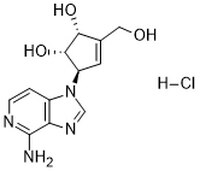506069 Sigma-AldrichInSolution™ EZH2 Inhibitor, DZNep - CAS 120964-45-6 - Calbiochem
A 25 mM (1 mg/98 µL) sterile-filtered solution of Histone Methyltransferase EZH2 Inhibitor, DZNep in H₂O.
More>> A 25 mM (1 mg/98 µL) sterile-filtered solution of Histone Methyltransferase EZH2 Inhibitor, DZNep in H₂O. Less<<Synonyms: NSC 617989, 3-Deazaneplanocin A, xHCl, yH₂O {x = 3 & y = 2}, (1S,2R,5R)-5-(4-Amino-1H-imidazo[4,5-c]pyridin-1-yl)-3-(hydroxymethyl)cyclopent-3-ene-1,2-diol, xHCl, yH₂O {x = 3 & y = 2}
Recommended Products
Overview
| Replacement Information |
|---|
Key Specifications Table
| CAS # | Empirical Formula |
|---|---|
| 120964-45-6 | C₁₂H₁₄N₄O₃ • HCl |
Pricing & Availability
| Catalog Number | Availability | Packaging | Qty/Pack | Price | Quantity | |
|---|---|---|---|---|---|---|
| 5.06069.0001 |
|
Glass bottle | 1 mg |
|
— |
| Product Information | |
|---|---|
| CAS number | 120964-45-6 |
| Form | Liquid |
| Formulation | A 25 mM (1 mg/98 µL) sterile-filtered solution of Histone Methyltransferase EZH2 Inhibitor, DZNep (Cat. No. 252790) in H₂O. |
| Hill Formula | C₁₂H₁₄N₄O₃ • HCl |
| Chemical formula | C₁₂H₁₄N₄O₃ • HCl |
| Reversible | Y |
| Quality Level | MQ100 |
| Applications |
|---|
| Biological Information | |
|---|---|
| Primary Target | EZH2 |
| Purity | ≥98% by HPLC |
| Physicochemical Information | |
|---|---|
| Cell permeable | Y |
| Dimensions |
|---|
| Materials Information |
|---|
| Toxicological Information |
|---|
| Safety Information according to GHS |
|---|
| Safety Information |
|---|
| Product Usage Statements |
|---|
| Packaging Information | |
|---|---|
| Packaged under inert gas | Packaged under inert gas |
| Transport Information |
|---|
| Supplemental Information |
|---|
| Specifications |
|---|
| Global Trade Item Number | |
|---|---|
| Catalog Number | GTIN |
| 5.06069.0001 | 04055977243031 |
Documentation
InSolution™ EZH2 Inhibitor, DZNep - CAS 120964-45-6 - Calbiochem SDS
| Title |
|---|
References
| Reference overview |
|---|
| Sun, F., et al. 2009. Mol. Cancer Ther. 8, 3191. Miranda, T.B., et al. 2009. Mol. Cancer Ther. 8, 1579. Fiscus, W., et al. 2009. Blood 13, 2733. Tan, J., et al. 2007. Genes Dev. 21, 1050. Chiang, P.K., et al. 1992. J. Biol. Chem. 267, 4988. Tseng, C.K., et al. 1989. J. Med. Chem. 32, 1442. Glazer, R.I., et al. 1986. Biochem. Biophys. Res. Commun. 135, 688. |
Technical Info
| Title |
|---|
| White Paper - The Message in the Marks: Deciphering Cancer Epigenetics |
| Data Sheet | ||||||||||||||||||||||||||||
|---|---|---|---|---|---|---|---|---|---|---|---|---|---|---|---|---|---|---|---|---|---|---|---|---|---|---|---|---|
|
Note that this data sheet is not lot-specific and is representative of the current specifications for this product. Please consult the vial label and the certificate of analysis for information on specific lots. Also note that shipping conditions may differ from storage conditions.
|







